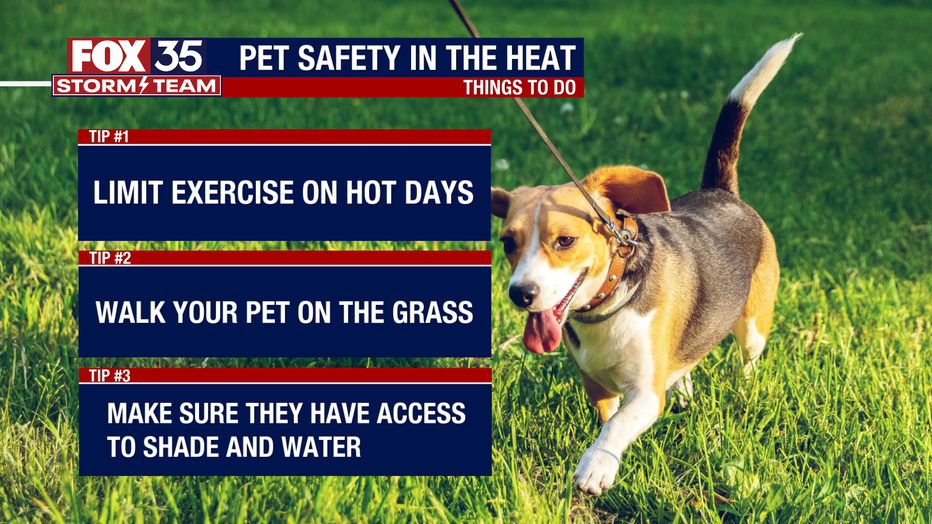Orlando sees hottest Fourth of July in 25 years: Here's how hot it got
Orlando weather forecast: July 4, 2023
FOX 35 Storm Team Meteorologist Ian Cassette breaks down what to expect on the hottest Fourth of July in years.
No question about it - it was another hot and humid day in Central Florida. In fact, Orlando International Airport peaked at 97 degrees on Tuesday, marking the hottest Fourth of July in Orlando in the last 25 years, according to online weather data.
This is the actual high temperature, not including the heat index – or "feels like" – temperature, which have soured above 100 degrees for the last several days as a so-called "heat dome" has kept temperatures stagnant over much of the southeast.
The record for the date is 98 degrees set in 1936. However, the last Fourth of July that saw 97 degrees was in 1998 – 25 years ago.
Most of Central Florida was under a heat advisory on Tuesday as the "feels like" temperature ranged between 105 and 112 degrees, hot enough to cause heat illness if people do not stay hydrated and cool.
Here's a look at Fourth of July high temperatures since 1990:
- 1990: 94 degrees
- 1991: 91 degrees
- 1992: 97 degrees
- 1993: 95 degrees
- 1994: 85 degrees
- 1995: 95 degrees
- 1996: 89 degrees
- 1997: 96 degrees
- 1998: 97 degrees
- 1999: 88 degrees
- 2000: 90 degrees
- 2001: 91 degrees
- 2002: 87 degrees
- 2003: 92 degrees
- 2004: 93 degrees
- 2005: 93 degrees
- 2006: 89 degrees
- 2007: 88 degrees
- 2008: 88 degrees
- 2009: 92 degrees
- 2010: 85 degrees
- 2011: 94 degrees
- 2012: 92 degrees
- 2013: 92 degrees
- 2014: 90 degrees
- 2015: 95 degrees
- 2016: 95 degrees
- 2017: 93 degrees
- 2018: 85 degrees
- 2019: 95 degrees
- 2020: 93 degrees
- 2021: 91 degrees
- 2022: 95 degrees
Signs and symptoms of heat stroke, heat exhaustion
Heat exhaustion is a mild heat-related illness that happens when it's hot and you don't drink enough water, according to the CDC. The elderly, people with high blood pressure and people exercising or working in the heat are at the highest risk for heat exhaustion. Here are symptoms to look out for:
- Excessive thirst
- Profuse sweating
- Headache
- Dizziness or confusion
- Nausea
How to keep yourself safe in the heat
Here are some tips you can follow to stay safe in the heat, according to the CDC:
- Drink lots of non-alcoholic fluids
- Wear sunscreen and continue to reapply it
- Wear a hat and/or sunglasses
- Wear loose, lightweight, light-colored clothing
- Plan outdoor activities when it's cooler in the day
- Rest often
- Try to stay in the shade when outdoors
- Try to limit strenuous activities for one hour per day

How to keep pets safe in the heat
Don't forget about your furry friends when it gets hot out – they can suffer from heat-related illness, too. Here are some tips to help you keep your dogs, cats and everything in between safe when it's hot out, according to the CDC and the American Society for the Prevention of Cruelty to Animals:
- Never leave your pet in a parked car (cracking a window isn't enough – temperatures can rise almost 20 degrees in the first 10 minutes, even if the window is open)
- Provide plenty of fresh water and leave it in a shaded area
- Don't let your pets linger on a hot street or sidewalk
- Keep all unscreened windows and doors in your home closed
- You can trim your dog, but don't shave them as layers of dogs' coats can protect them from overheating and sunburn

